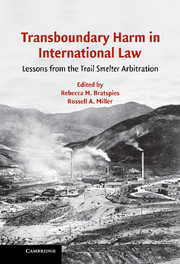Book contents
- Frontmatter
- Contents
- Contributors
- Acknowledgments
- Foreword by David D. Caron
- TRANSBOUNDARY HARM IN INTERNATIONAL LAW
- Introduction
- PART ONE THE TRAIL SMELTER ARBITRATION – HISTORY, LEGACY, AND REVIVAL
- PART TWO TRAIL SMELTER AND CONTEMPORARY TRANSBOUNDARY HARM – THE ENVIRONMENT
- 11 Trail Smelter in Contemporary International Environmental Law: Its Relevance in the Nuclear Energy Context
- 12 Through the Looking Glass: Sustainable Development and Other Emerging Concepts of International Environmental Law in the Gabčikovo-Nagymaros Case and the Trail Smelter Arbitration
- 13 Trail Smelter's (Semi) Precautionary Legacy
- 14 Surprising Parallels between Trail Smelter and the Global Climate Change Regime
- 15 Sovereignty's Continuing Importance: Traces of Trail Smelter in the International Law Governing Hazardous Waste Transport
- 16 The Legacy of Trail Smelter in the Field of Transboundary Air Pollution
- 17 The Impact of the Trail Smelter Arbitration on the Law of the Sea
- PART THREE TRAIL SMELTER AND CONTEMPORARY TRANSBOUNDARY HARM – BEYOND THE ENVIRONMENT
- Annex A Convention Between the United States of America and the Dominion of Canada Relative to the Establishment of a Tribunal to Decide Questions of Indemnity and Future Regime Arising from the Operation of Smelter at Trail, British Columbia
- Annex B Trail Smelter Arbitral Tribunal Decision, April 16, 1938
- Annex C Trail Smelter Arbitral Tribunal March 11, 1941, Decision
- Index
13 - Trail Smelter's (Semi) Precautionary Legacy
Published online by Cambridge University Press: 08 September 2009
- Frontmatter
- Contents
- Contributors
- Acknowledgments
- Foreword by David D. Caron
- TRANSBOUNDARY HARM IN INTERNATIONAL LAW
- Introduction
- PART ONE THE TRAIL SMELTER ARBITRATION – HISTORY, LEGACY, AND REVIVAL
- PART TWO TRAIL SMELTER AND CONTEMPORARY TRANSBOUNDARY HARM – THE ENVIRONMENT
- 11 Trail Smelter in Contemporary International Environmental Law: Its Relevance in the Nuclear Energy Context
- 12 Through the Looking Glass: Sustainable Development and Other Emerging Concepts of International Environmental Law in the Gabčikovo-Nagymaros Case and the Trail Smelter Arbitration
- 13 Trail Smelter's (Semi) Precautionary Legacy
- 14 Surprising Parallels between Trail Smelter and the Global Climate Change Regime
- 15 Sovereignty's Continuing Importance: Traces of Trail Smelter in the International Law Governing Hazardous Waste Transport
- 16 The Legacy of Trail Smelter in the Field of Transboundary Air Pollution
- 17 The Impact of the Trail Smelter Arbitration on the Law of the Sea
- PART THREE TRAIL SMELTER AND CONTEMPORARY TRANSBOUNDARY HARM – BEYOND THE ENVIRONMENT
- Annex A Convention Between the United States of America and the Dominion of Canada Relative to the Establishment of a Tribunal to Decide Questions of Indemnity and Future Regime Arising from the Operation of Smelter at Trail, British Columbia
- Annex B Trail Smelter Arbitral Tribunal Decision, April 16, 1938
- Annex C Trail Smelter Arbitral Tribunal March 11, 1941, Decision
- Index
Summary
INTRODUCTION
Although almost every discussion of state responsibility begins with its talismanic invocation, time has not been kind to the Trail Smelter arbitration. Its primary contributions to international law have been the statement that: “no State has the right to use or permit the use of its territory in such a manner as to cause [environmental] injury … in or to the territory of another,” and its requirement that Canada pay the United States compensation for damages. Although these Trail Smelter principles have become customary international environmental law, the arbitration itself is often viewed as a quaint remnant of a bygone world. As Mark Drumbl succinctly explains, many scholars view Trail Smelter's marginalization as inevitable in light of international law's evolution from a state-to-state realm to one of multilateral, consensus-based actions. Others have suggested that the arbitration's impact is blunted by the fact that harm was not contested before the Tribunal. This unique combination of characteristics leads many to conclude that Trail Smelter has little relevance for resolving the thorny transboundary environmental challenges that beset our ever-globalizing world.
I think the case has much to teach modern international environmental law, but for somewhat unconventional reasons. In the context of global warming, Russell Miller points out that the arbitration offers some procedural lessons as well as its famous Trail Smelter principles. This chapter explores one of the arbitration's least considered facets – the decisional process itself.
- Type
- Chapter
- Information
- Transboundary Harm in International LawLessons from the Trail Smelter Arbitration, pp. 153 - 166Publisher: Cambridge University PressPrint publication year: 2006



